If the truth is told, I pay scant attention to baseball these days. Even during my final three decades in the USA, I got interested only when the playoffs began. That rose—somewhat—through the World Series as I watched and read about the games. Not too enthusiastic, was I? Certainly not compared with my youth when the sport was vitally important. Those were the days of Mickey and Willie and Hank and Sandy and Eddie and Roberto, et al. I can easily tell you who won the title in 1960 (Pittsburgh Pirates over the New York Yankees, 1961 (Yankees over the Cincinnati Reds), 1962 (Yanks over the San Francisco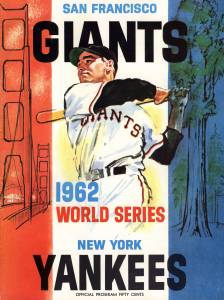 Giants) and 1963 (Los Angeles Dodgers over the Yanks), that the bold and brassy Oakland A’s pulled a trifecta from 1972 to 1974 and so forth. But 2020? I would have to look it up (the Dodgers beat the Tampa Bay Rays). With time and distance, my fondness for baseball has grown even weaker. The reasons for this precipitous swoon are explicated below.
Giants) and 1963 (Los Angeles Dodgers over the Yanks), that the bold and brassy Oakland A’s pulled a trifecta from 1972 to 1974 and so forth. But 2020? I would have to look it up (the Dodgers beat the Tampa Bay Rays). With time and distance, my fondness for baseball has grown even weaker. The reasons for this precipitous swoon are explicated below.
The main issue is pace of play; it has become excruciatingly slow. Consider the aforementioned Series between LA and Tampa Bay, held seven months ago in Arlington, Texas. Only two balls were put into play during the final 26 minutes of Game 6, rendering the Dodgers champs. Over the course of the entire game, balls were put into play once every 6 ½ minutes! There were 27 strikeouts, a staggering 42% of plate appearances.
Here we are in 2021 in this electronically wired world in which things are happening at warp speed. People have increasingly shorter attention spans. They crave action and movement, but baseball gives them little of either. There is way too much dead time and too few balls are being put into play. The game has devolved into a chess match between pitcher and batter, ending too often in one of the so-called three true outcomes: home run, strikeout or walk. There is no longer any shame in whiffing. I wonder what Joe DiMaggio, who struck out just 369 times in his brilliant 13-year career with the Yankees, would think. Nellie Fox, who had more than 10,000 at-bats in 19 seasons (mostly with the Chicago White Sox) went down on strikes only 216 times.
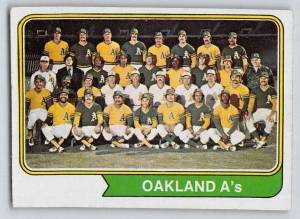
Please forgive all the stats, but they are pertinent: The ball is now put into play on only 15.8% of pitches. Fourteen more pitches are thrown per game than 10 years ago and 46 more than in 1988. There is an average of four minutes between balls being put into play, compared with 3 minutes, 18 seconds a decade ago. The strikeout rate has set a record each of the past 15 years; K’s are now more frequent than hits. Batting averages and stolen base attempts are the lowest since 1972 when Reggie Jackson, Bert Campaneris, Joe Rudi, Sal Bando and Catfish Hunter were beginning their reign in Oakland. Now, more than 40% of runs are generated by homers. It’s rock ’em, sock ’em and little else.
I can think of no better example of an everything-or-nothing batter than Giancarlo Stanton. He played for the Florida Marlins from 2010 to 2017 and has been with the Yankees since then. This strapping outfielder/designated hitter with the 13-year, $325 million contract swings for the fences virtually every at-bat, regardless of the game situation. Stanton has no plate discipline; from his nose to his toes, anything goes. The pitchers are aware, so they throw him junk, and he can’t resist. He has struck out 1,418 times in his career. Stanton’s deal, by the way, breaks down to about $167,000 per game and $50,000 per at-bat. His even bigger teammate, Aaron Judge, had a day to forget in 2018 against Detroit, striking out eight (8) times in a doubleheader.
Between 2008 and 2019, average attendance at Major League Baseball games has dropped from 32,369 to 28,199. That’s 4,000-plus people who have concluded they have better things to do. The average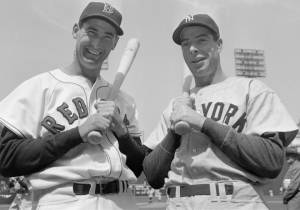 pitcher now takes 24.9 seconds to deliver, the slowest being Justin Verlander of the Houston Astros and David Price of the Dodgers at 27 seconds. When asked about it, Price is defiant. “I know I’m slow,” he says. “I don’t care.”
pitcher now takes 24.9 seconds to deliver, the slowest being Justin Verlander of the Houston Astros and David Price of the Dodgers at 27 seconds. When asked about it, Price is defiant. “I know I’m slow,” he says. “I don’t care.”
Batters are to blame as well, stepping out of the box after almost every pitch. Unwrapping and then wrapping their batting gloves—please! Conferences on the mound between managers, catchers and pitchers bring on more dead time. Some of those confabs, however, are necessary since baseball has become paranoid about sign-stealing. (I’m talking to you, 2017 Astros.)
Why are there so few rallies? Whatever happened to the hit and run, or double steals or drag bunts? Baseball needs more doubles and triples, because those hits result in action on the field. I refer not just to hitting and base running but defensive play. With so few balls being put into play now, fans can scarcely appreciate the glove work and throws of guys like third basemen Matt Chapman of the A’s and Nolan Arenado of the St. Louis Cardinals, shortstops Francisco Lindor of the New York Mets and Andrelton Simmons of the Minnesota Twins, right fielder Mookie Betts of the Dodgers, first baseman Freddie Freeman of the Atlanta Braves and catcher Tucker Barnhart of the Reds.
Baseball has become a snoozer partly because of the implementation of sabermetrics. Managers today play strictly percentage baseball, as directed by the people who hire them. Everything is measured, calibrated and put on a spread sheet, even—I am serious—the spin rate of a curve ball. All 30 teams now have analytically driven front offices. Guys with advanced degrees from top universities, many of whom 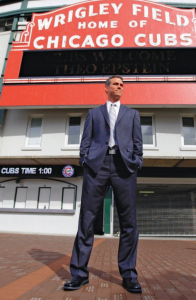 never played the game, process data and seek incremental advantages. Few are guiltier than Theo Epstein (BA, Yale University and J.D, University of San Diego) who became the general manager of the Red Sox at age 28 in 2002. Two years later, the Sox were World Series champions—and again in 2007. He moved to Chicago, and the Cubs won it in 2016. Epstein, while not apologizing for winning, admits that he and others like him have “unwittingly had a negative impact.”
never played the game, process data and seek incremental advantages. Few are guiltier than Theo Epstein (BA, Yale University and J.D, University of San Diego) who became the general manager of the Red Sox at age 28 in 2002. Two years later, the Sox were World Series champions—and again in 2007. He moved to Chicago, and the Cubs won it in 2016. Epstein, while not apologizing for winning, admits that he and others like him have “unwittingly had a negative impact.”
Retired players like Goose Gossage, Chipper Jones, Don Sutton, Mike Hargrove and Pete Rose say the current game is almost unwatchable. It is slow, boring, bland and devoid of variety. Albert Pujols, now nearing the end of the line with the Angels, agrees. So does Jim Leyland, former manager of the Pirates, Marlins, Rockies and Detroit Tigers.
A variety of suggestions have been posited to help enliven the game—outlawing defensive shifts, limiting the number of pickoff attempts, putting a clock on pitchers (one that is actually enforced), standardizing the strike zone, limiting the number of pitchers used in an inning, keeping batters in the box and so forth. I read of one proposal to move the pitcher’s mound back a few feet. Purists, of course, howl at the very idea of changes which would violate the sanctity of the game.
Well, guess what? Baseball is facing an existential crisis. It has to find a way to change the present moribund pace of play. Commissioner Rob Manfred knows this is a problem and has discussed it with the owners and the Players’ Association. His predecessor, Bud Selig, did the same. The owners and players drag their feet and say there are more important issues.
Baseball, once a vital part of American culture, has lost any such status. One-third of all MLB teams engage in the strategic practice of tanking—losing now in the hope of winning in the future—but that is antithetical to the concept of competitive sports. In 2019, cost-conscious baseball executives decided to cut ties with 42 of their minor league teams, including the Class AA Binghamton Rumble Ponies, the High Class A Daytona Tortugas, the Low Class A Lexington Legends, the Short Season Tri-City Dust Devils and the Rookie League Missoula Osprey. That left 42 small towns across the country without pro baseball, although those clubs could theoretically continue on without MLB affiliation. To make matters worse, kids seldom play the game anymore. When was the last time you saw a pickup game going on at a local school or park? Little League numbers have been dropping for years. One bit of good news is that the game is thriving overseas. But in the land of its birth, where the Hall of Fame is located, home to all but one of MLB’s franchises (the Toronto Blue Jays being the exception), baseball is sick. I hesitate to say the sport is on its deathbed, but the doctor is nervous and is thinking maybe he should call a priest to administer last rites to the patient.
When Manfred kowtowed to radical lefties with all the kneeling and Only Black Lives Matter stuff during the COVID-shortened 2020 season, he alienated a lot of patriotic and loyal fans. (Certainly no less true for the NFL and the NBA.) I point out that OBLM is a Marxist organization, and that these players—few of them well educated—have been disrespecting the flag, the country and the free enterprise system that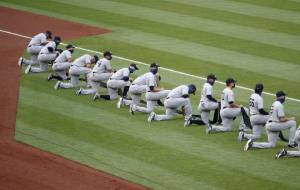 made them wealthy. They can state their views before and after games, but not during. Along the same line was Manfred’s agreement to move the 2021 All-Star Game from Atlanta to Denver. It was alleged that Georgia’s law, which requires citizens to show some form of identification to vote, constitutes “voter suppression” and violates their civil rights. This, I assert, is all a cynical show, a way to facilitate the Democratic Party’s ongoing grab for power.
made them wealthy. They can state their views before and after games, but not during. Along the same line was Manfred’s agreement to move the 2021 All-Star Game from Atlanta to Denver. It was alleged that Georgia’s law, which requires citizens to show some form of identification to vote, constitutes “voter suppression” and violates their civil rights. This, I assert, is all a cynical show, a way to facilitate the Democratic Party’s ongoing grab for power.
While I am at it, what is the All-Star Game these days? In my youth, there was no inter-league play, and each side wanted to win. They had separate identities, and they were intent on proving themselves superior. Now, prima donnas of both the American and National Leagues put in cameo appearances, if they do not beg off altogether. And by the 4th inning, some have already showered and left for the airport. Baseball’s All-Star Game has been severely degraded.
I am stunned to realize that MLB is financially healthy. Gross revenues have increased each of the past 17 years and are now up to $10.7 billion. TV deals with FOX, ESPN and Turner Sports are expected to push that number even higher in the next few seasons.
Finally, I must mention two devoted baseball fans. One is my deceased brother, Dude, and the other is Andy in Canada. Dude, who lived his whole life in the Dallas area and hadn’t read a book since high 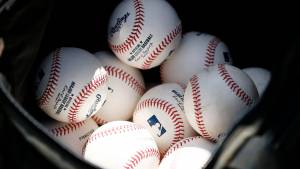 school, nevertheless did well enough as a used-car salesman to splurge on Texas Rangers season tickets. I thought this was just absurd. Eighty-one times per year (more, if the Rangers got into the playoffs), Dude sat through these brain-deadening games. Andy, a devotee of the Tigers, follows the sport with unflagging interest. He likes watching games in person at Comerica Park and in the comfort of his home, at sports bars and via his smart phone. To him, baseball is just fine and there is no need for any changes whatsoever. He gets irritated when I ask him about pace of play.
school, nevertheless did well enough as a used-car salesman to splurge on Texas Rangers season tickets. I thought this was just absurd. Eighty-one times per year (more, if the Rangers got into the playoffs), Dude sat through these brain-deadening games. Andy, a devotee of the Tigers, follows the sport with unflagging interest. He likes watching games in person at Comerica Park and in the comfort of his home, at sports bars and via his smart phone. To him, baseball is just fine and there is no need for any changes whatsoever. He gets irritated when I ask him about pace of play.

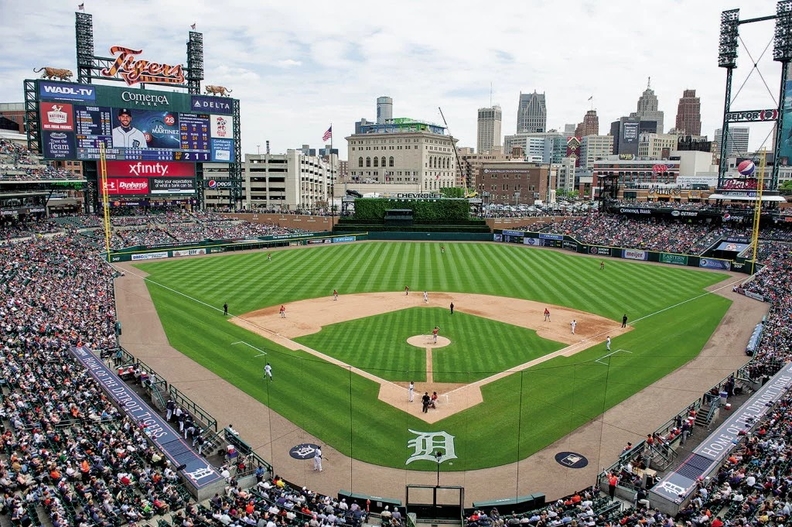
12 Comments
I admit that the baseball games I have enjoyed are the ones where we were in a suite with friends and were served beverages and great food. It is a rare occasion. With a few exceptions the game bored me.
I am disgusted by these most recent actions and I personally do not intend to watch another game. (No great loss for baseball). The argument about the Atlanta voting law being racist is just plain stupid. The politicians that have spoken out in support of this nonsense sound like fools.
If this hatred and disrespect for our flag and country continues, I will have no interest in sports at all. It’s a shame.
Thank you, Vicki! We certainly agree. As much as I detest the slowness of the game, I can forgive it. But the OBLM stuff–no way.
Good one, Richard and captured a lot of how I now feel about MLB. I’ve stopped watching it but never watched much anyway. I didn’t realize how much the game has slowed down. They shouldn’t slowed down an already slow, if interesting, sport. Hopefully, lots of people will turn it off and MLB will get back to baseball, but I’m not holding my breath. The Left pretty much trashes anything it gets its hands on. Kevin
This is like my critique of “Dallas” a few weeks ago…I never watched it, but I bothered to write about it!! Baseball these days–terrible. Can you believe, 6 1/2 minutes between balls put into play at end of Game 6 of the Series??? Who can watch that???????????
Like soccer, baseball is fun to play but has always been boring to me to watch, especially on TV. It used to be fun to go to the beautiful ballpark in Arlington and before that to the old Turnpike stadium for all the theatrics and food and drink. The Rangers WS years with changes of philosophies brought in by the great Nolan Ryan got me interested for a bit but then Jon Daniels with help from new ownership destroyed that so yeah, back to boring. The O added to BLM was new to me and I think I will steal it. A local pizza place in Arlington began selling T-shirts a few years back that said “Black Olives Matter” but controversy ended that touch of humor.
Ha!! I would have bought one of those pizzas!!!!
Richard:
A terrific article with outstanding research. I grew up in New York loving baseball along with Willie, Mickey, and the Duke. The average time of a game now is over three hours and like you said, there’s really nothing being done to shorten it. If they enforced a pitching clock and not let the batter get out of the box on every pitch, they would less the time by at least a half hour.
We have been in Tucson for three years but have not driven over to Phoenix to watch a Diamondbacks game. Maybe down the road.
Thanks, again, for a great article.
Rex
Thank you, Rex. Three years, and never a trip from Tucson to Phx to see the D-backs?? What would Ring say??
I am in agreement with you and Vicki on the way sports in general have become so politically charged. I’m tired of the few who are changing everything to support the left along with the OBLM movement. I don’t even watch sports!
Denise, this politicization of baseball (and for that matter, other sports) bothers me far more than the slow pace of the game. I simply refuse to watch or read about or pay attention to this stuff.
There is nothing, Richard, in your essay with which I can disagree. Several other retired teachers and I took in a minor league game yesterday. Seven runs were scored and six pitchers were used but the entire affair took but 2:28. THAT is what baseball is supposed to be. By the way, no player took a so-called knee. It’s against league rules and the tough town that Joliet, Illinois is would not tolerate the aberrant behavior. Frontier League execs and players respect the fans and vice versa. Play ball: the traditional way.
Nine innings in 2:28, sounds good. I bet the ball was put in play more than in that World Series game. Everybody sitting, nothing happening for such long stretches…this is baseball? thanks for reading, Dex
Add Comment